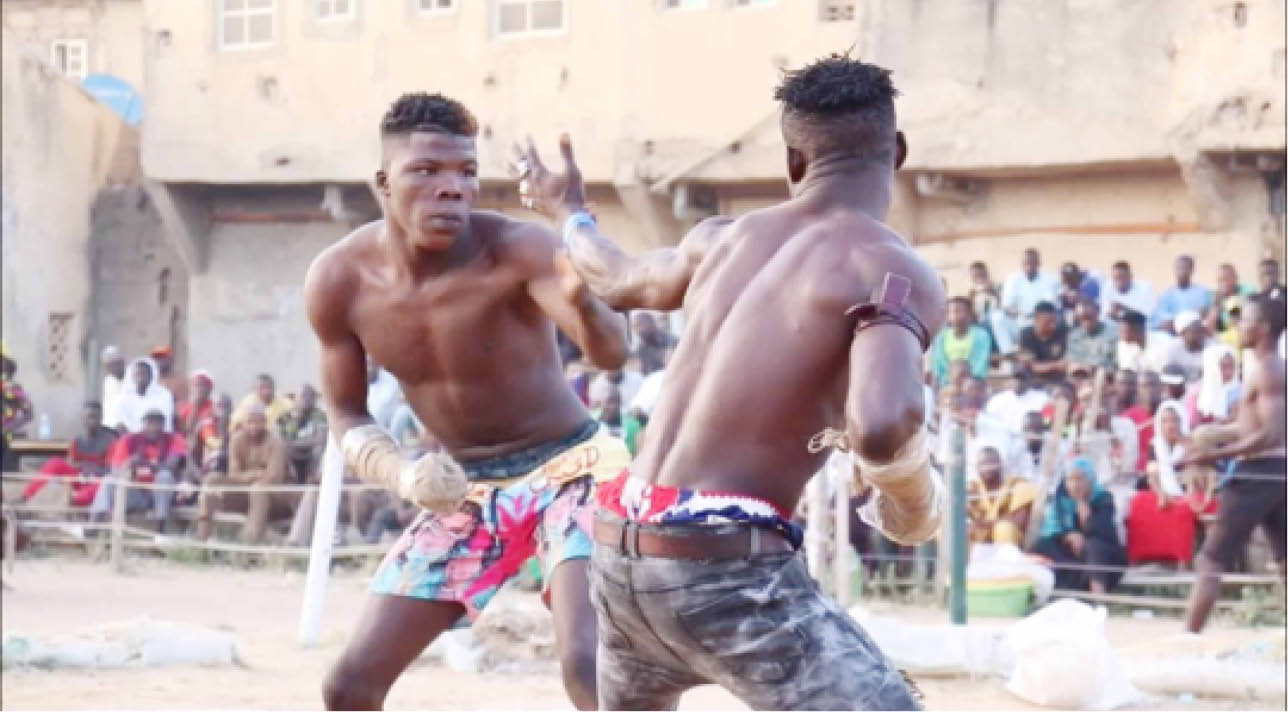Traditionally, the Hausa people celebrate the harvest season with a combat sport that incorporates spiritualism, knockout punches and kicks. Dambe has created a culture of music and poetry around it and a long line of champions. Today, the sport is leveraging on new media to make a stronger comeback in the ancient city of Kano, as Daily Trust reports.
Transcending successive generations, dambe, the traditional martial art mostly associated with the Hausa culture, has perched somewhere between the past and the present.
The game is gradually adjusting its archaic garb and is proving that there is a grey area between the “absolutely traditional and the completely modern” that it can straddle.
The use of lethal items that might cause grave bodily harm and sometimes death, like shards of glass sewn into kara (strips fighters wound around their hand as gloves) has since been abolished.
Though a traditional sport, the game is growing and drawing huge crowds of young people, gradually becoming a leading sporting attraction in major cities.
Dambe is a martial art match in three rounds without a set time. The length of the rounds is determined by the referee at his discretion or is ended when one of two contestants is knocked to the ground.
Every competitor aims to bring (in the local parlance “kill”) his opponent into total submission. This is achieved more often than not either through kicks or punches and often results in the opponent being knocked out, or being knocked to the ground.
Dambe may be a brutal sport that has left many with broken jaws or ribs, scarred and misshapen faces or missing teeth, but for its many fans, it has great entertainment value.
It has spun a whole genre of music and poetry devoted to it and this is often played to musical accompaniment as contestants square up against each other.
“Dambe is as old as the Hausa culture itself. It has been the sport, on par with wrestling (kokawa), to mark the end of the harvest season. Fishermen would engage butchers to show bravery.
“A warrior would engage another and the winner would emerge after knocking his opponent to the ground,” Habu Dikko, a spectator, said.
The promoters
Kano’s Ado Bayero Square, once the heartbeat of athletics in the state, is enjoying a new lease of life thanks to the resurgence of dambe. All over the once busy sports complex, there are now signs celebrating and promoting dambe.
Dambe Trado, the promoters, have made sure the combat sport, which traces its origin to several centuries back, finds a perfect place in contemporary times. In here, one could find the passion that perhaps could echo what was obtained in ancient Roman amphitheatres.
The Kano Dambe Trado stadium (a makeshift arena) is designed as a freestanding, oval-shaped structure fenced with roofing sheets. The arena itself is demarcated by iron bars and sandbags.
Excited spectators sit on wooden benches placed on elevated platforms around the arena, while some sit on the ground, close to the arena.
The fighters jump into the arena in shorts with one hand, the punching hand, also called mashi (spear), strapped in kara, while the other hand, used for blocking and called kari (shield), is left unbound. They punch. They kick.
“Every sport, be it football or hockey, is traditional in nature, but later on, it graduates to something else. Dambe saw its major boost with its inclusion into the Nigerian Sports Festival at Imo in 1998,” Chairman of Dambe Trado, Muhammad Bashar Danliti said.
He added: “We have been working unrelentingly since we came in to make sure the sport gets the attention it deserves in modern-day Nigeria and beyond.
“Many of the fighters have let go of the habit of itinerary fighting because we organize one competition after another and a winner gets a good deal of prize.”
These days heavywelghts compete for cars, motorcycles and cash.
Hundreds of people, young and old, men and women, troop into “Gidan Damben Kano” every afternoon to watch the combat sport.
Persuasion does matter
It is not only to religion or politics “persuasion” is attached; persuasion is one of the key features of Hausa martial art and the fans take pride in that.
Yet, one needs not to belong to the Arewa (Jamus), Kudawa or Guramada persuasions of dambe to be addicted to the game; even people with neutral stand love the game and view it as a shock absorber, something they enjoy and while away time with.
This is true for an avid fan, Malam Auwalu Yakubu Dan Kano.
“I am a Ba’are (Jamus) and I am proud of that. I started watching it when I was young during the reign of the first governor of Kano State, Audu Bako.
“My late father would lead me by the arm to the ringside. Since then, I have been watching the game and fast holding onto Arewa as my dambe persuasion,” he said.
Fighters have their own chief
Various competitions are organized and played at the Kano Dambe Trado stadium year in year out.
A fighter may crush out one opponent after another to win for instance the Ganduje Cup or any competition of that repute, but that will never make him the chief of dambe.
The traditional title comes with a grand victory in the Kano Emir’s Cup, but the challenges are enormous as fighters come from various parts of the country to tussle it out for the exalted title.
Science and spiritualism adjoined
Any dambe athlete one sees is a warrior who has developed a strong footing in tradition and yet holds fast to technology for survival.
The sponsorship funding is powered by technology as the promoters go digital with many YouTube channels springing up to showcase the sport.
The spiritual part of the sport is significant. Dambe warriors have their forearms, depending on whether he is right-handed or left-handed, dotted with razor cuts at least one centimetre long and stuffed with herbs or concoctions until the cuts heal. They believe this gives them strength. In years of yore, more extreme ones would reportedly bury their fists in the mounds of a grave and spend the night with their hands buried in the sand. They also believe this helps them knock out any opponent they hit.
But the times are different now. And technology has been incorporated into the fabric of the sport. If you take away technology, you are willingly or unwillingly shutting out the martial art from the world, which is now the major source of income to the promoters.
Yet, separating the sport from its spiritual aspect may take away something from the fighters.
Perhaps the juxtaposition of science and spiritualism is one of the greatest mysteries that keeps the game going.

 Join Daily Trust WhatsApp Community For Quick Access To News and Happenings Around You.
Join Daily Trust WhatsApp Community For Quick Access To News and Happenings Around You.


